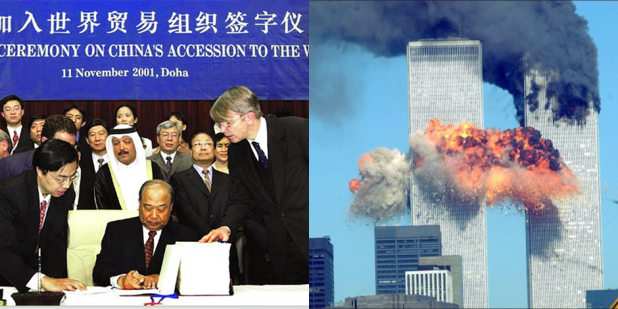Happy Lunar New Year from the USC US-China Institute!
Twenty Years Later

Subscribe to our weekly newsletter to get it delivered straight to your inbox!
2001 was a pivotal year. America experienced the deadliest terrorist attack ever and China entered the World Trade Organization. The 9/11 tragedy in the U.S. led to its global war on terror. The government ramped up military spending, created a new Department of Homeland Security, and expanded security and surveillance measures. The official U.S. military presence in Afghanistan ended only last week. China undertook reforms and pledged still more to secure entry into the WTO. U.S. leaders hoped that more fully integrating China into the global trading system would encourage its transition to market economy and a more open political system. China’s leaders were confident that greater access to foreign markets and a continuing flow of foreign capital and technology would advance China’s economy and improve living standards.
The charts below track China’s economic rise from the sixth largest economy to number two and the increase in U.S. military spending to a peak in 2010. After some belt tightening, spending picked up again during the Trump administration.
China’s economic transformation and the revolution in information technology can be seen in the companies topping the global revenues lists. Of the six American companies in the global top 10 in 2001, only Walmart is still among the leaders. American tech and healthcare firms have joined energy giants and pushed ahead of automobile companies on the list. Chinese state-owned energy titans are among the top ten companies in revenues (#2 State Grid, #4 China National Petroleum, and #6 Sinopec). Global automakers are still well represented, in some cases benefitting from China’s emergence as the world’s largest auto market. Shanghai Automotive, a partner of both General Motors and Volkswagon, joined the list along with Dongfeng Motor. Chinese tech giants Alibaba, JD.com and Tencent have joined Amazon, Alphabet, Microsoft and Facebook on this global 100 list. Chinese financial firms, mostly state-owned are also prominent. China's private sector has been its most dynamic and profitable, but in recent years, the state has reasserted its dominant role through dictate and regulation. The global 100 in terms of revenues include 36 based the U.S. and 30 based in China. Of these 9 from the U.S. and 19 from China were not even in the top 500 in 2001.
Featured Articles
We note the passing of many prominent individuals who played some role in U.S.-China affairs, whether in politics, economics or in helping people in one place understand the other.
Events
Ying Zhu looks at new developments for Chinese and global streaming services.
David Zweig examines China's talent recruitment efforts, particularly towards those scientists and engineers who left China for further study. U.S. universities, labs and companies have long brought in talent from China. Are such people still welcome?








